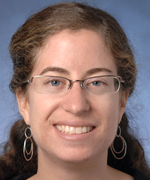Rachel Lopez Rosenberg, BCC
 May 2012
May 2012
As a Spanish-speaker, most of Chaplain Rachel Rosenberg’s patients at Mission Hospice & Home Care tend to be Christians, primarily Catholics. The fact that she is “joyfully Jewish,” as she says, hasn’t been a problem for her.
“I grew up with a strong Jewish identity and I love being Jewish,” she said. “As a chaplain, I’m always interested in bearing witness to other people’s stories. I say that I’m here to provide spiritual and emotional support. Sometimes we have a dialogue about our faiths. People want to know what Judaism says about the afterlife. But the basis of chaplaincy is that it’s an interfaith endeavor.”
Rosenberg, who joined the staff as a half-time chaplain in January, trained in UCSF Medical Center’s year-long Clinical Pastoral Education program after working and volunteering in several other health care programs.
The daughter of a Jewish father and culturally Catholic Panamanian mother, Rosenberg grew up in San Francisco bilingual in Spanish and English. “I was raised Jewish but I would call us mostly secular,” she said. “We went to synagogue several times a year. We also celebrated Christmas and Easter, but not religiously.”
She majored in Latin American studies and Portuguese at Smith College in Massachusetts, including spending a year in Brazil. She said she chose the major because it allowed her to take courses in a wide variety of topics including history, language, political science and the like.
She returned to San Francisco after graduation and was trained at the Jewish Healing Center to be a volunteer visitor at the Jewish Home in San Francisco. She still visits one of the elderly patients she met through the program.
Later, she became an AmeriCorps volunteer working at Lyon Martin Health Services coordinating patient referrals. That’s when she learned about the UCSF chaplaincy program and began the intense training in 2010. Mission Hospice hired her a few months after she graduated. “I was really excited to work with a Spanish-speaking population,” she said. “There are so many barriers in health care, and language is one of the major ones.”
Compared to the often chaotic hospital environment, she said she also appreciates being able to visit patients in their homes and to get to know them and their families over a much longer period of time.
“Despite the fact that people are dying, relationships are being formed,” she said. “For me, the experiences that are most memorable are the ones where I feel a great tenderness with my patient, where we share a special, sweet moment. Visiting people in their homes is a great joy for me.”
